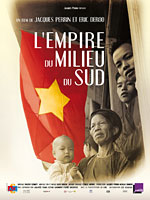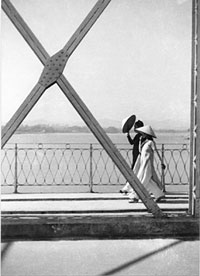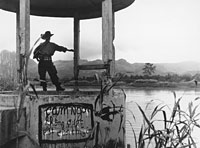|
en français
|
time schedule
| feature films
|
short films
| program [PDF]
2011 Festival Feature Films (March 24-27)

French director Jacques Perrin and production manager Olli Barbé present L’Empire du Milieu du Sud
directors Jacques Perrin, Eric Deroo executive producers Jacques Perrin, Nicolas Dumont
production manager Olli Barbé
running time 1 h 26 min general audience
Synopsis
Using images of unreleased archives about Vietnam coming from all parts of the world, accompanied by literary texts of Vietnamese (Nguyen Trai, Nguyen Du, Bao Ninh), French (André Malraux, Albert de Pouvourville, Marguerite Duras, Pierre Schoendoerffer) and Americans, Jacques Perrin and Eric Deroo retrace the fascinating and painful story of Vietnam, from the French colonization to the fall of Saigon.
Coming from the south of China thousands of years ago, the Vietnamese have not ceased fighting against invaders from neighboring regions. As subjects of the Empire du Milieu du Sud, the Vietnamese people have continuously claimed their legitimacy over the northern Delta and then the entire long peninsula, while expelling their successive Western invaders.
director/screenwriter/actor
Jacques Perrin
| 2009 |
Le Bel âge by Laurent Perreau |
| 2008 |
L’Empire du Milieu du Sud by Jacques Perrin, Eric Deroo |
| |
Tabarly by Pierre Marcel |
| 2007 |
Faubourg 36 by Christophe Barratier |
| |
Océans by Jacques Perrin, Jacques Cluzaud |
| 2006 |
Modern Love by Stéphane Kazandjian |
| 2005 |
Le Petit Lieutenant by Xavier Beauvois |
| 2004 |
Les Choristes by Christophe Barratier |
| |
Le Carnet rouge by Mathieu Simonet |
| |
L’Enfer by Danis Tanovic |
| 2003 |
La Vie comme elle va by Jean-Henri Meunier |
2002
|
11’09’’01 by Youssef Chahine, Amos Gitaï, Shohei Imamura, Alejandro Gonzalez Inarritu, Claude Lelouch, Samira Makhmalbaf, Mira Nair, Idrissa Ouédraogo, Sean Penn, Danis Tanovic, Ken Loach |
| 2001 |
Le Pacte des loups by Christophe Gans |
| |
Là-haut by Pierre Schoendoerffer |
2000
|
Le Peuple migrateur by Jacques Perrin, Michel Debats, Jacques Cluzaud |
| |
La Tranchée by William Boyd |
| |
Scènes de crimes by Frédéric Schoendoerffer |
| 1999 |
Himalaya, l’enfance d’un chef by Eric Valli |
| |
C’est pas ma faute by Jacques Monnet |
| 1998 |
Combat de fauves by Benoit Lamy |
1996
|
Microcosmos – Le Peuple de l’herbe by Claude Nuridsany, Marie Perennou |
| 1995 |
Les Hirondelles ne meurent pas à Jérusalem by Ridha Behi |
| |
Les Enfants de Lumière by Pierre Philippe |
| 1993 |
Montparnasse – Pondichéry by Yves Robert |
| 1992 |
Eaux dormantes by Jacques Trefouel |
| |
La Course de l’innocent by Carlo Carlei |
| |
Guelwaar, légende africaine de l’Afrique du XXIè siècle by Ousmane Sembene |
| 1991 |
L’Ombre by Claude Goretta |
| |
Hors la vie by Maroun Bagdadi |
| |
La Contre-allée by Isabel Sebastian |
| |
Rien que des mensonges by Paule Muret |
| |
La Femme de l’amant by Christopher Frank |
| 1989 |
Vanille fraise by Gérard Oury |
| |
Le Peuple singe by Gérard Vienne |
| |
Cinema Paradiso by Giuseppe Tornatore |
| 1985 |
Parole de flic by José Pinheiro |
| 1984 |
Le Juge by Philippe Lefèbvre |
| |
L’Année des méduses by Christopher Frank |
| |
Paroles et musique by Elie Chouraqui |
| 1982 |
L’Honneur d’un capitaine by Pierre Schoendoerffer |
| |
Les Quarantièmes Rugissants by Christian de Chalonge |
| 1981 |
Le Sang du flamboyant by François Migeat |
| |
La Désobéissance by Aldo Lado |
| 1980 |
Une robe noire pour un tueur by José Giovanni |
| |
La Légion saute sur Kolwezi by Raoul Coutard |
| 1979 |
L’Adoption by Marc Grunebaum |
| 1978 |
La Part du feu by Etienne Perrier |
| 1977 |
Le Crabe tambour by Pierre Schoendoerffer |
| |
Le Désert des Tartares by Valerio Zurlini |
| 1976 |
La Victoire en chantant by Jean-Jacques Annaud |
| 1975 |
Section spéciale by Costa-Gavras |
1974
|
La Spirale by Jacqueline Mepplet, Valérie Mayoux, Armand Mattelard |
| 1973 |
Etat de siège by Costa-Gavras |
| 1972 |
Blanche by Walerian Borowczyk |
| 1970 |
Peau d’âne by Jacques Demy |
| |
L’Etrangleur by Paul Vecchiali |
| 1969 |
Z by Costa-Gavras |
| 1968 |
La Petite Vertu by Serge Korber |
| 1967 |
L’Ecume des jours by Charles Belmont |
| |
L’Horizon by Jacques Rouffio |
| |
Vivre la nuit by Marcel Camus |
| |
Le Grand Dadais by Pierre Granier-Deferre |
| 1966 |
Les Demoiselles de Rochefort by Jacques Demy |
| |
La Corruption by Mauro Bolognini |
| 1965 |
Compartiment Tueurs by Costa-Gavras |
| 1964 |
La 317ème section by Pierre Schoendoerffer |
| |
Le Procès des Doges by Duccio Tessari |
| 1962 |
Journal intime by Valerio Zurlini |
| 1961 |
Les Croulants se portent bien by Jean Boyer |
| 1960 |
La Fille à la valise by Valerio Zurlini |
director/writer
Eric Deroo
| 2008 |
L’Empire du Milieu du Sud by Jacques Perrin, Eric Deroo |
| 1993 |
Morrocan Goumiers by Ahmed El Maanouni |
Statement of intent from Jacques Perrin
It has been 10 years since I started the project L’Empire du Milieu du Sud and since I have amassed a volume of archival film about Vietnam, both professional and amateur, that no film library in the world possesses.

I have known Southeast Asia for a long time and I am familiar with the fascination experienced by those who visit whether in times of war or in times of peace. Vietnam is a country that casts a sweet spell on those who enter it and has the ability to create a connection between all those who have spent a part of their life there. This is the case for those who have written or been a part of the production of this film and for all those who have left their mark in the Indochinese peninsula. Those who have fought in this land, in these rice fields, did not return the same as those who fought in other lands.
The history of Vietnam is also ours, as French, as Americans. This is what motivated us to make this film. It is certainly an exception, a film outside the norm, where history is not only presented in chronological order, where the names of the protagonists are less important than the anonymous and exemplary theater in which these men from all walks of life have clashed and suffered.
From “ism” to “ism” — communism, idealism, socialism, capitalism — whoever they are, soldiers and resistance fighters, all die in the same way, some in the excitement of their youth, their tragic and absurd destiny.
We wanted to make a film not simply about Vietnam but a film about why society engages in proclaiming “Never again, never again war.” Slogans to which the Vietnamese poet replied, “War is the business of the living.”
Statement of intent from Eric Deroo
The project L’Empire du Milieu du Sud posed a double challenge. Technically, it is the outcome of research, extensive collection of all records filmed about Vietnam in the entire world, archived films, documentaries and fiction, professional and amateur.
From Japan to Cuba, from Sweden to Australia, Russia to the United States, from France to Vietnam, from China to Hungary, from Poland to Holland, all the archives have been consulted and hundreds of hours of films have been watched. The use of records that had been stored, meetings with directors, operators, editors, archivists and survivors have uncovered previously unpublished, forgotten films that were thought of last, pictures never developed, never arranged.
Entire sequences were reconstructed from a wide variety of sources; amateur documents never seen since they returned from the war are restored. All digitized.
A unique example, this film is approached from different angles: science, history and memory enable the formation of a corpus of interesting images in Vietnam and beyond, across the entire peninsula. To capture the extraordinary and too often tragic destiny of this country, the biggest names in cinema and documentary helped to produce this film.
After months of viewing, nearly 100 hours of “rushes” were selected and organized along a timeline. They were mostly geographical, historical and poetic themes unique to Vietnam. Artistically (i.e., regarding the cinematographic writing) after months of screening, it appeared to us that most of the gathered images contain or capture the elements that constitute the profound nature of the soul of Vietnam, a soul that shows through its literature, poetry, music, Vietnamese arts and, more recently, cinema.
As heirs to the Chinese Confucian tradition, the Vietnamese occupy  a symbolic universe between sky and earth, mountains and water. The Nam Tien movement, also called “The South March,” finally concluded in 1975 with the occupation of Saigon by the Northern troops — an irreversible motion like the long battle between water and mountains, sky and earth, iron, forest and fire, a brawl between giants in which humans only occupy a tiny, predetermined space. A nature that transcends history even if the latter was particularly violent in Indochina, and makes the ambitions, the vain human attempts all the more poignant, pathetic, desperate, cruel and sometimes admirable. a symbolic universe between sky and earth, mountains and water. The Nam Tien movement, also called “The South March,” finally concluded in 1975 with the occupation of Saigon by the Northern troops — an irreversible motion like the long battle between water and mountains, sky and earth, iron, forest and fire, a brawl between giants in which humans only occupy a tiny, predetermined space. A nature that transcends history even if the latter was particularly violent in Indochina, and makes the ambitions, the vain human attempts all the more poignant, pathetic, desperate, cruel and sometimes admirable.
Thus, we have imagined and constructed the film around these emblematic and recurring elements present in all of our images — the water, the earth, the sky, the iron, the fire — with the Southern March as the geographical and historical context. The Southern March unwound with the rhythm of a day torn from eternity, its dawn on the frontier of China in the north, its evening on the tip of Ca Mau on the Gulf of Thailand in the south.
Dialogues illustrate such a movement: excerpts taken from poetry, literature, propaganda, commentaries on newsreels from the period, declarations, letters written by any number of protagonists in the Indochinese odyssey. Spoken in the voice of Jacques Perrin, these short quotes certainly give essential data for historical understanding but often provide another echo of the images, supporting or abandoning them, reinforcing or contradicting them, creating this elusive emotion, close to being missed, better than any serious demonstration, representing the fragile beauty of the human world.
A challenge for the archivists of Cinéma des Armées by Isabelle Gougenheim, director of ECPAD (France’s Defense Office of Communication and Media Production)
When Jacques Perrin and Eric Deroo proposed to participate in the great adventure of L’Empire du Milieu du Sud to the Defense Office of Communication and Media Production, the challenge was not only to undertake the collection of rare or unpublished images but also to initiate a systematic search of the 4 million photographs and the 23,500 film titles that make up the collection of Cinéma des Armées.
After the initial work of identification and comparison, often shot-by-shot to stay faithful to the history and fulfill the intentions of the directors, the time came for restoration and digitization. Patient work, executed by a motivated team who plunged back into the rush of the members of the Press Information Service of Indochina, the famous SPI of Corcuff, Kowal or Péraud … heirs of the first reporters from the Army Sections for Photography and Film created in 1915.
Immediately abandoning the idea of overly “institutionalized” reporting, the team of researchers found images that, according to the authors’ wishes, showed “the profound environment and soul of Vietnam” and at the same time carried traces of the story of those who had written, filmed and fought.
In fact, despite the weight of the war and its trail of misery, the SPI reporters were able to cover extensive territories, filming all they wanted, capturing not only the destiny of the French troops of the Corps Expéditionnaire d’Extrême Orient but the local populations they fused with as well. From it stemmed Regards sur l’Indochine, a formidable documentary series, still unedited to this day, and of which the images have construed an irreplaceable source for illustrating this walk toward the south by the Vietnamese people, essential to the authors.
This journey in the steps and with the eyes of the reporters of the Corps Expéditionnaire d’Extrême Orient is a true human and technical adventure. Translating in black and white the forcefulness of the elements requires not only talent but a quality of the soul which is still apparent in these images that are still available to us. And this is the force of a cinematographic work like L’Empire du Milieu du Sud for which conservation and digitization of the collection take all their meaning, because from now on these documents are preserved from the destruction of time. |

